|
|
|
Sort Order |
|
|
|
Items / Page
|
|
|
|
|
|
|
| Srl | Item |
| 1 |
ID:
180025
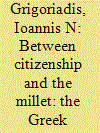

|
|
|
|
|
| Summary/Abstract |
As one of Turkey’s non-Muslim minorities, Turkey’s Greeks have faced substantial pressures since the founding of republican Turkey. As its members could not claim their constitutional rights as citizens of Turkey, emigration soared and the minority reached a point of near extinction. Significant improvements were noted when the EU-supported reform transformed the Turkish state and society from 1999 to 2010, which were not reversed as Turkey relapsed to democratic backsliding in the following years. This article explores the social dynamics and ideological frameworks that have contributed to novel perceptions of the Greek minority since after 2002, the year the Justice and Development Party (Adalet ve Kalkınma Partisi-AKP) came to power and have deterred a significant deterioration since Turkey’s democratic backsliding began. It also examines the state of Turkey’s Greeks by focusing on the state of the pious foundations, the Papa Eftim affair and the situation in the islands of Gökçeada (Imbros) and Bozcaada (Tenedos).
|
|
|
|
|
|
|
|
|
|
|
|
|
|
|
|
| 2 |
ID:
180030


|
|
|
|
|
| Summary/Abstract |
This article studies the reforms undertaken within the Lebanese state during the term of president Fouad Chehab (1958–1964) and their effects on Lebanese politics and bureaucracy. The article demonstrates that, while there were many positive results that came from these changes, the vision behind them, the methods of their execution, as well as the short time in which they were enforced, made them unsustainable as a long-term solution for Lebanese clientelism and corruption. Inherently, these reforms – though desperately needed – were not in any sense radical, and Chehab’s loyalty to the country and his army, combined with his distaste for politics, meant that the implementation of change came at the cost of long-term planning and the improvement of administrative culture. In addition, the measures that accompanied the army’s involvement in politics clashed with the Lebanese power-sharing system, and did not materialise into real democratic change. Ultimately, the degree to which Chehab’s reforms challenged many of the traditional Lebanese elite, and alienated much of the Lebanese population, resulted in a very tense socio-political situation that would break down only a few years later.
|
|
|
|
|
|
|
|
|
|
|
|
|
|
|
|
| 3 |
ID:
180020
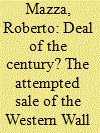

|
|
|
|
|
| Summary/Abstract |
This article discusses the offer made by Cemal Pasha in 1915 to Albert Antébi to sell the area in front of the Western Wall in Jerusalem in order to dismantle the nearly thirty houses owned by the Moroccan inhabitants of the Maghrebi Quarter and create a space ‘reserved for the prayers of the Jewish people’. European Jews had already sought to purchase the same area from the Ottomans for several decades but had been denied, a situation that did not change under British rule despite the support given to the Jews with the Balfour Declaration. After the 1929 riots in Palestine, any possibility of acquiring the Western Wall or converting the Maghrebi Quarter into a plaza was postponed. This article will address relevant correspondence available at the Zionist Archives that chronicles this decades-long effort and discuss the questions relating to failure and secrecy. The individuals involved took an oath promising never to discuss this business out of concerns about revealing divisions among Zionists in relation to holy places and symbols.
|
|
|
|
|
|
|
|
|
|
|
|
|
|
|
|
| 4 |
ID:
180022
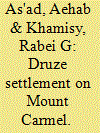

|
|
|
|
|
| Summary/Abstract |
The arrival date of the Druze at Mount Carmel is still unclear and several claims exist regarding it. None of the Druze villages have been extensively studied, and at present there are only two villages that survived the dismantling of the last two centuries; these are Daliyat al-Karmil and ʿIsifya. The current study will focus on Daliyat al-Karmil as a case study, using geographical, historical and archaeological evidence for dating the Druze arrival at Mount Carmel. The main claim suggests that the town began its journey during the early seventeenth century under the rule of Emir Fakhr al-Din al-Maʿani II; and another claim suggests that the town was built after the rule of Fakhr al-Din II, mostly because of immigration from Lebanon and Syria, as a result of the battle of ʿAyn Dara in 1711. Combining historical, archaeological and geographical evidence has led the present study to suggest that the settling of the town of Daliyat al-Karmil, as well as the other Druze settlements on Mount Carmel, did not begin before the seventeenth century. Moreover, it adds that the Druze inhabitation at Daliyat al-Karmil was among the earliest in the Carmel, and it probably began between 1622 and 1635.
|
|
|
|
|
|
|
|
|
|
|
|
|
|
|
|
| 5 |
ID:
180027


|
|
|
|
|
| Summary/Abstract |
In multilingual Iran, Persian continues to be perceived as the official language, while other languages are regarded as local. The duality is not confined to linguistic realms, and extends into the purview of culture. Terms such as ‘local music’, ‘local dance’ or ‘local dialects’ and, with the same token, ‘official language’ and ‘official religion’, for example, refer to much wider and deeper social relations or cultural positions. They are the sources of the production and perpetuation of meanings, to borrow from Bourdieu, which safeguard the interest of a social group or class, and determine the performance of the producers of knowledge, for example writers, without their being directly part of the dominant group.
|
|
|
|
|
|
|
|
|
|
|
|
|
|
|
|
| 6 |
ID:
180031


|
|
|
|
|
| Summary/Abstract |
This article is the first attempt to examine the dynamics of Hamas’s political discourse since the movement’s birth with relations to mobilization. Based on extensive primary sources and interviews with Hamas leaders in Gaza, the article identifies three key framing processes. First, at its inception, Hamas’s words and actions centered around the movement’s interpretation of Islam from 1987 to 1993. Second, during the Oslo period from 1993-2000, Hamas attempted to de-frame its religious discourse. Third, from 2000 to the present, Hamas has reframed its discourses around the more inclusive concept of muqawama or resistance. While Hamas was in office after 2006, Hamas’s notions of resistance, however, eschew a sole meaning and instead function as a floating signifier. Each of these framings are investigated by relation to changing socio-political realities. The article argues that Hamas is not necessarily becoming either less Islamic or more secular-nationalist. Rather, the employment of the discourses of muqawama – that is, as a non-religious and more inclusive term – is better suited to Hamas’s current mobilization needs, and the rearticulation of its evolving worldview, without jeopardizing its religious identity.
|
|
|
|
|
|
|
|
|
|
|
|
|
|
|
|
| 7 |
ID:
180023
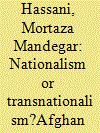

|
|
|
|
|
| Summary/Abstract |
Relations between religion and nationalism, as two identity forms, has been debated in Muslim countries, especially where the nationalist trends coincided with the rise of religious reformation and Pan-Islamic movements. This article scrutinizes discourses on linking a transnational ideology of Pan-Islamism with Afghan nationalism in an early twentieth century nationalist newspaper, Seraj-ul Akhbar. The newspaper presents a unique case for this study since it was a platform for dissemination of both ideologies simultaneously. Unlike the later Muslim Brotherhood intellectuals and Muhammad Iqbal, Seraj-ul Akhbar authors did not see a contradiction between Pan-Islamism and territorial nationalism. They formulated a universal Muslim unity going through the national state structure, but not bypassing them. Meanwhile, Seraj-ul Akhbar appropriated the religious language for strengthening national unity. In this way, nationalistic and Pan-Islamic concepts were used to craft a nationally stable identity. It is argued that Pan-Islamism is not a unitary universal transnational ideology, rather it is often embedded in different national, language, and ethnic boundaries.
|
|
|
|
|
|
|
|
|
|
|
|
|
|
|
|
| 8 |
ID:
180028
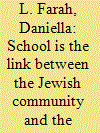

|
|
|
|
|
| Summary/Abstract |
This article offers a thematic examination of the significant role education played among the Jews of Iran from the mid-1940s to the late 1960s. I focus on the work of the Alliance Israélite Universelle, the Franco-Jewish philanthropic organization which established its first school in Iran in 1898. The Alliance – which viewed Iranian Jews as backwards and degenerate – aimed to modernize them via Western education. In this article, I demonstrate that the Alliance’s work in Iran helped the Jews move up the socio-economic ladder and provided them with opportunities to integrate into the broader non-Jewish Iranian milieu. By exploring the disputes that arose between the Alliance and local Iranian Jews, I also show that Iran’s Jews did not always accept the Alliance’s paternalistic attitudes. To discuss the overall impact of education on Iranian Jews, I situate the history of Jewish education in Iran within the Pahlavi state’s nationalizing campaigns.
|
|
|
|
|
|
|
|
|
|
|
|
|
|
|
|
| 9 |
ID:
180026
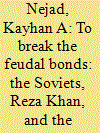

|
|
|
|
|
| Summary/Abstract |
From 1921-25, the USSR normalized its relations with Iran, withdrawing support from the Soviet Socialist Republic of Iran in the northern province of Gilan (SSRI, 1920-21), and signing the Irano-Soviet Treaty of Friendship in February of 1921. Thus far, most scholarship has argued that material interests, and especially Soviet designs on Iranian oil, compelled their anti-revolutionist turn in Iran. This article, which draws upon original collections from the Archive of Foreign Policy of the Russian Federation (AVPRF) and others, argues that the defeat of the SSRI did not mark the final Soviet attempt to socialize Iran, but rather the first of several that recruited leftist parties, tribal actors, and even the Shi‘ite clerical establishment until 1923. Secondly, this article argues that the Soviets eventually threw their support behind Reza Khan not only because some senior policymakers believed that his modernizing authoritarianism would provide the preconditions for Iranian socialism, but also because of a growing hostility to the Iranian left, whose revolutionary designs the Soviets eventually deemed premature. These findings are supported by archival diplomatic reports and communiques, which the author employs to interrogate the knowledge production intended by the Soviets to justify their anti-revolutionist turn in Iran.
|
|
|
|
|
|
|
|
|
|
|
|
|
|
|
|
|
|
|
|
|